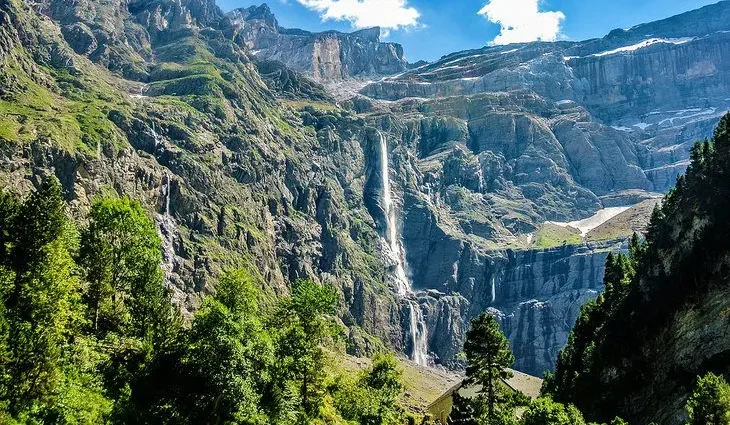Contents
- 1. Grande Cascade de Gavarnie
- 2. Cascade du Rouget
- 3. Cascade du Pont d’Espagne
- 4. Cascades du Hérisson
- 5. Cascade d’Ars
- 6. Cascade du Trador
- 7. La Grande Cascade du Mont-Dore
- 8. Sillans-la-Cascade
- 9. Cascade des Veyrines
- 10. La Grande Cascade – Le Cirque de Saint-Même
- 11. Cascade du Pissieu
- Map of Waterfalls in France
Grandiose waterfalls have an awe-inspiring quality. The refreshing mists and sublime scenery (reached by taking invigorating hikes) rejuvenate the body, while the sound of flowing water soothes the soul and lifts the spirits. France offers an incredible variety of nature sites for anyone chasing waterfalls.
Magnificent landscapes with rushing cascades await visitors in all corners of the country, from the majestic Pyrenees Mountains near the border with Spain to the mighty French Alps next to Switzerland and the rural pasturelands of Auvergne at the heart of France.
Visitors marvel over the beauty of waterfalls that drape limestone cliffs at the Cirque de Gavarnie and the rush of freshwater through densely wooded forests in the French Alps. Sometimes the landscape is as dramatic as the waterfall, such as La Grande Cascade du Mont-Dore, which overlooks a soaring volcanic peak.
To reach most of the waterfalls on this list requires some type of hike or walk, and getting there is half the fun. Not only is the scenery thrilling, it’s relaxing and bliss-inducing. The sound of the rushing water, interrupted only by birdsong, rewards those who take some of the longer hikes during the off-season.
Commune with nature, and plan wonderful outdoorsy excursions with our list of the best waterfalls in France.
1. Grande Cascade de Gavarnie
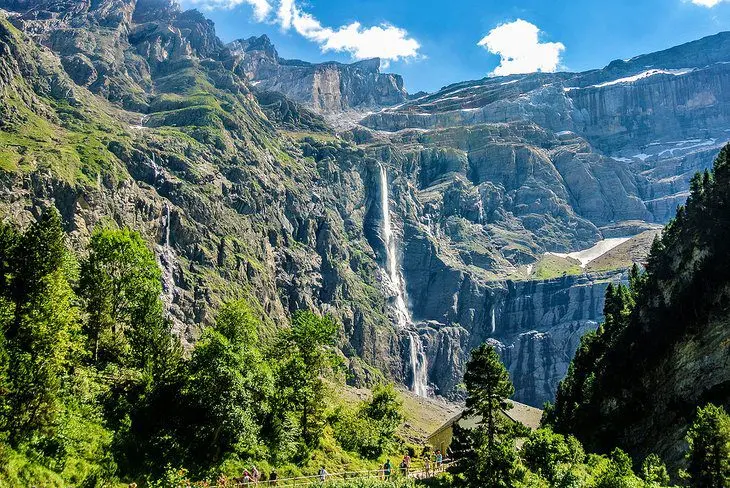
A UNESCO World Heritage Site, the Cirque de Gavarnie provides a sublime backdrop for the Grande Cascade de Gavarnie. This breathtaking waterfall, the tallest waterfall in France, drops 425 meters, and is enclosed within the Cirque de Garvarnie’s towering limestone ridges. Shaped like an amphitheater, the cirque walls soar 1,500 meters and feature three distinct terraces, capped with snow; the circumference extends for over six kilometers.
Ever since the 18th century, the Cirque de Gavarnie has inspired poets, painters, scientists, and mountaineers. Victor Hugo described the circular rock wall as a “colosseum of nature” because of its impressive proportions. Today, the Cirque de Gavarnie is part of the Parc National des Pyrénées (Pyrenees National Park) in the Pyrenees region.
For all its splendor, the Grande Cascade de Gavarnie is surprisingly easy to reach. A gentle footpath, almost completely flat, begins in the charming village of Gavarnie, follows alongside the Gave de Pau (stream) through the Vallée de Gavarnie (valley), and winds around forests until arriving at the Cirque de Gavarnie. The hike takes two to three hours (round trip) at a leisurely pace.
From the village of Gavarnie, it’s a four-kilometer walk (horseback rides are available) to the Hôtel du Cirque et de la Cascade, where guests enjoy cozy accommodations, half-board meals, and dazzling vistas. Dating to 1845 and newly reopened after over 50 years of closure, this recently renovated boutique hotel blends old-fashioned decor with modern amenities: a lounge/game room, sauna, and a brasserie restaurant. The hotel is open from mid-June through October.
La Brasserie de l’Hôtel du Cirque et de la Cascade serves traditional cuisine of the “terroir” on an outdoor terrace with views of the Grande Cascade. Dishes are prepared from local ingredients such as truite des Pyrénées (trout of the Pyrenees) and cheese made in the region. The restaurant is open daily for lunch, from May through October. A restaurant that exclusively serves hotel guests is open in the evenings for dinner.
2. Cascade du Rouget
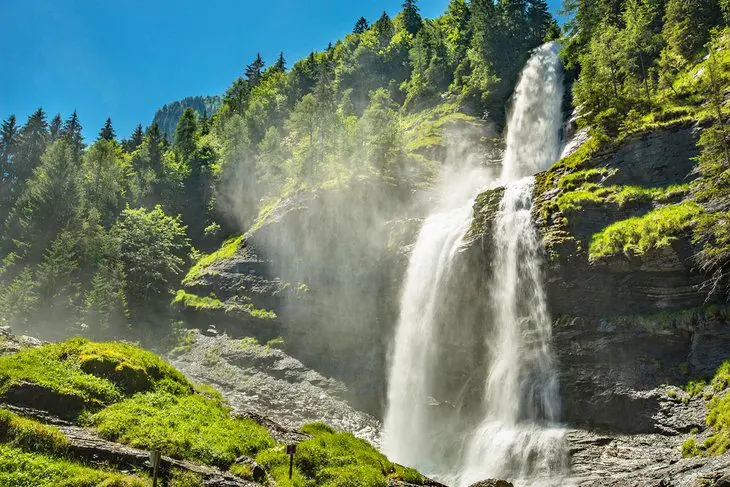
The Réserve Naturelle de Sixt-Fer-à-Cheval is the largest protected wilderness area in the Haute-Savoie department of the French Alps region. This spectacular nature reserve abounds with natural wonders: fragrant pine forests, soaring snowcapped mountains, and rushing waterfalls. The Cirque du Fer-à-Cheval resembles the Cirque de Gavarnie, with multiple waterfalls plunging from sheer limestone cliffs.
Within the Sixt-Fer-à-Cheval nature reserve and part of the Cirque du Fer-à-Cheval, the Cascade du Rouget lives up to its moniker “Queen of the Alps.” A leafy wooded environment conceals the 80-meter waterfall, which features a double cascade that flows down a jagged cliffside.
The Cascade du Rouget is easy to access by taking a short hike. From the trailhead in the town of Salvagny, it is only about 200 meters to reach the waterfall.
While in the area, travelers should visit the nearby village of Sixt-Fer-à-Cheval. This typical alpine village, set in a splendid valley, has an abbey that dates to the 12th century. The abbey’s dormitory buildings now house a center of art and culture, which hosts free exhibitions during the summer.
3. Cascade du Pont d’Espagne
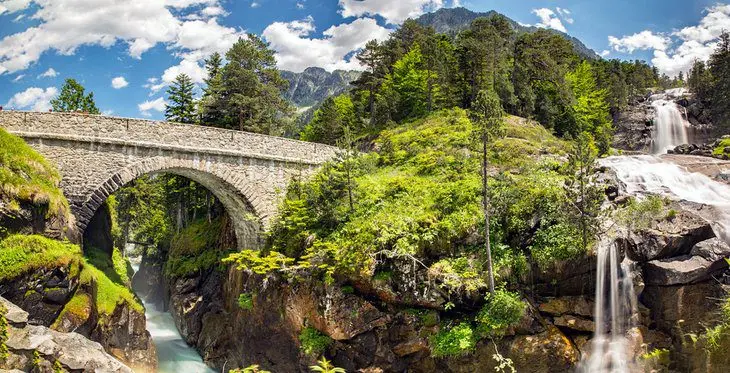
An eye-catching stone bridge, Le Pont d’Espagne (the Bridge of Spain) spans an enormous canyon near the French border with Spain. This breathtaking site within the Pyrenees National Park is classified as a “Grand Site Midi-Pyrénées” (“Great Site of the Midi-Pyrenees”) and is considered one of the must-see attractions in the Pyrenees region.
Built in 1886, the bridge stands at an altitude of 1,496 meters and provides a marvelous outlook onto a series of waterfalls, which flow through the deep ravine. A refreshing and cool woodsy setting adds to the enchantment of the scenery. The rushing Gave du Marcadau (river) is the source of the waterfalls.
To view the Cascade du Pont d’Espagne, travelers need only take a five-minute walk from the parking lot through a dense forest. It’s best to arrive early, since this popular spot gets crowded.
The Hôtellerie du Pont d’Espagne has guest rooms with views of the Cascade du Pont d’Espagne. In its incomparably scenic location, the hotel’s restaurant terrace looks directly onto the Pont d’Espagne and its waterfalls.
From the Pont d’Espagne, hikers can reach the dreamy Lac de Gaube. This shimmering expanse of emerald-green waters is surrounded by the craggy peaks of the Pyrenees Mountains. The hike takes about 75 minutes round trip. Next to the lake, the inviting Hôtellerie du Lac de Gaube welcomes visitors with casual dining on an outdoor patio.
The Pont d’Espagne is eight kilometers away from the lively ski resort and spa town of Cauterets, home to the upscale Les Bains du Rocher thermal spa facility. Another tourist site nearby (37 kilometers away) is the city of Lourdes, an important Catholic pilgrimage destination.
For those who would like to visit two waterfalls in one day, it’s possible to combine an excursion to the Pont d’Espagne with the Grande Cascade de Gavarnie. The Cirque de Gavarnie is 53 kilometers (about a 90-minute drive) away from the Pont d’Espagne.
4. Cascades du Hérisson
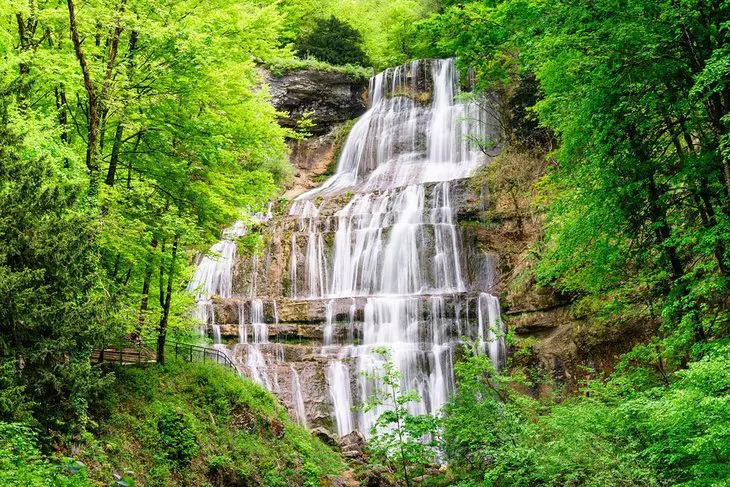
Pristine forests dotted with serene lakes and glorious waterfalls blanket the French Jura. Also known by the name of the historic province, the Franche-Comté, this area is one of the most picturesque regions of France.
One of the region’s many waterfalls, the Cascades du Hérisson is less than a one-hour drive (47 kilometers) from the town of Poligny, which ranks among the top places to visit in French Jura. The Hérisson waterfalls are found within the Vallée du Hérisson, Plateau des 7 Lacs. This site is classified as a Grand Site de France.
The Cascades du Hérisson comprises a succession of seven different waterfalls, with two sources: Bonlieu Lake and Ilay Lake. The lake waters flow into the Hérisson River, which travels through leafy forests for over three kilometers before plunging down limestone steps and cliffs. The tallest of the Hérisson waterfalls is the Cascade de l’Éventail, boasting a 65-meter drop.
From April through September, the Maison des Cascades in Val-Dessus welcomes visitors with excellent facilities: a small museum, a boutique, parking, a picnic area, and public restrooms. The Maison des Cascade is the starting point of a short hike (1.6 kilometers round trip) to the Cascade de l’Éventail, along the Hérisson River.
A seven-kilometer round-trip trail, Le Sentier des Cascades du Hérisson, allows hikers to discover all seven waterfalls. The trails are open to the public year-round.
5. Cascade d’Ars
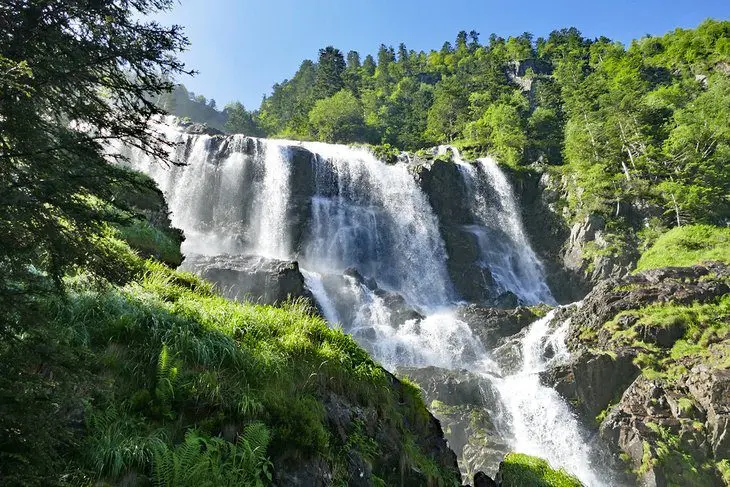
The Cascade d’Ars in the Pyrenees region has all the features of a magnificent waterfall: a splendid forest environment, fast-flowing gushes of water, and an awe-inspiring drop of nearly 250 meters. Adding to the visual interest, this waterfall plunges in three distinct segments.
Melting snow provides the source of water flow, which means that the Cascade d’Ars is most impressive in the late springtime (May and June).
An easy hike from the town of Aulus-les-Bains, through a forested valley and mountain path, provides access to the Cascade d’Ars. The out-and-back hike is approximately eight kilometers, takes about four hours round-trip, and requires a climb of 660 meters.
6. Cascade du Trador
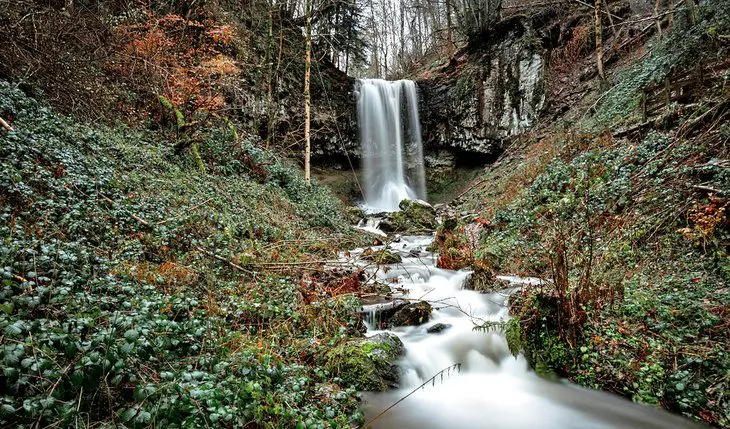
In the unspoiled Auvergne region, the Cascade du Trador dazzles visitors with its dramatic flow of fresh water over dark, vertically ridged volcanic rock. The lush forest environment creates a peaceful impression, and seasonal changes make for a lovely scene any time of year. The site is especially picturesque during autumn, when fall foliage enlivens the landscape.
One of many waterfalls found on the Puy de Dôme mountain peak (a Grand Site de France), the Cascade du Trador is located one kilometer from the quaint village of Laqueuille. Nestled amid bucolic rolling hills, the village is famous for its blue cheese, the Bleu de Laqueuille.
To arrive at the Cascade du Trador, visitors take a short hike along a groomed trail. This easy walk to the waterfall takes only 30 minutes. Parking is available next to the Verdeix Bridge.
7. La Grande Cascade du Mont-Dore
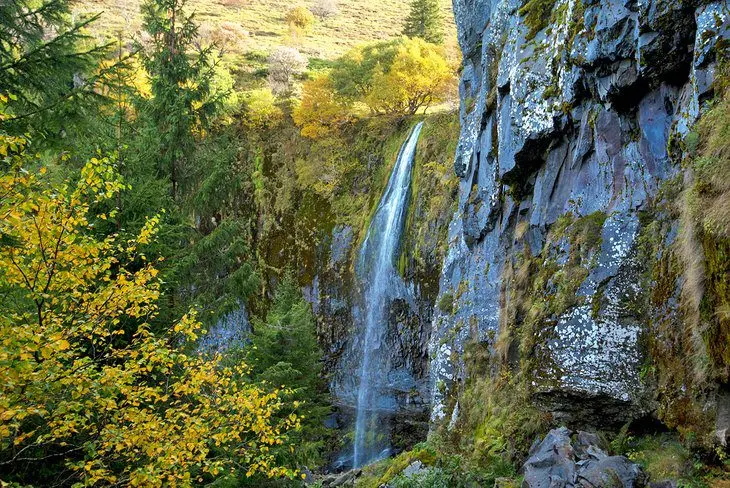
The volcanic landscape of La Grande Cascade du Mont-Dore, within the Parc Naturel des Volcans d’Auvergne, delights nature lovers with its gushing flow of freshwater, gurgling stream, and luxuriant vegetation. Plunging 32 meters from a lava rock cliff, La Grande Cascade is the tallest waterfall in the Auvergne region.
An intermediate-level hike to La Grande Cascade begins in the town of Mont-Dore. Hikers will find the start of the hike at the staircase opposite the Town Hall (la Mairie) near Les Thermes du Mont-Dore (thermal baths). From here, hikers follow the Chemin de Melchi-Rose and the Route de Besse to arrive at La Grande Cascade. Just under five kilometers round-trip, the out-and-back hike takes 1.5 hours to complete.
Visiting this waterfall offers the bonus of its mountain vistas. Hikers make their way through forest undergrowth and up steep hillsides around switchback paths. At the foot of La Grande Cascade, hikers will find a footbridge and staircase that provides access to the Plateau de la Durbise. The plateau affords sweeping views of the Haute Dordogne Valley and the Puy de Sancy peak that rises to 1,886 meters.
The hike to La Grande Cascade du Mont-Dore is possible in spring, summer, and autumn. During winter, access to La Grande Cascade is prohibited.
8. Sillans-la-Cascade
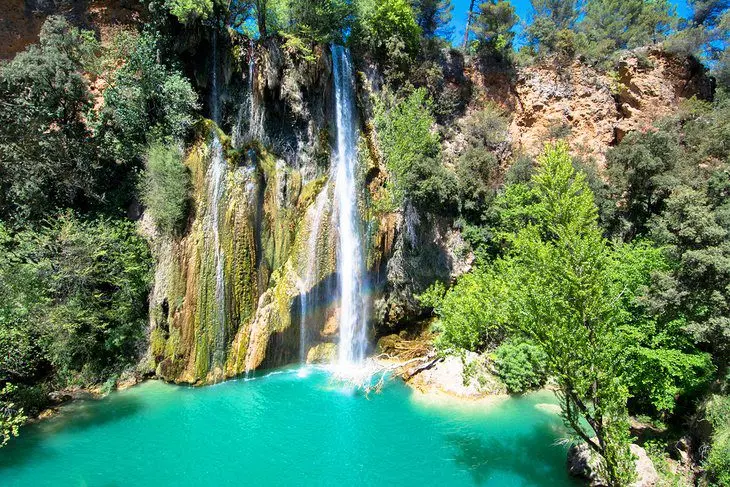
With its drapery of rushing water that falls into a tranquil pool of turquoise waters, the exotic environment of Sillans-la-Cascade feels like a small slice of paradise. This 42-meter waterfall is found in the Var department, a verdant corner of Provence.
Sillans-la-Cascade is close to some of the Provence region’s top places to visit: the Lac de Sainte-Croix (28 kilometers away) and the Verdon Regional Nature Park (38 kilometers away).
The town of Sillans-la-Cascade has a marked trail that leads to the waterfall. The trail is about two kilometers round trip and begins near the Mairie (Town Hall).
9. Cascade des Veyrines
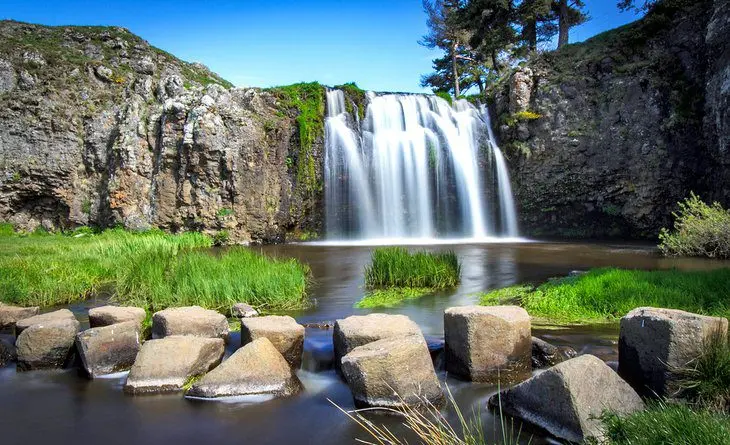
To see an amazing waterfall without the effort of hiking, the Cascade des Veyrines is a good choice. Visitors simply park their cars and walk a few steps to a staircase located next to the top of the waterfall. It’s possible to admire the Cascade des Veryrines from above or walk down the staircase to view the waterfall from its base.
The Cascade des Veyrines appears suddenly amid a vast expanse of rural landscape in the Auvergne region. Its source, the Ruisseau des Veyrines (stream), runs through a plateau blanketed in pasturelands. An abrupt drop in the plateau forms the waterfall. Although this is a short waterfall, the force of the water (especially in springtime) creates a striking impression.
During summertime, visitors often take a dip in the pool below the waterfall. Other things to do include fishing and picnicking.
10. La Grande Cascade – Le Cirque de Saint-Même
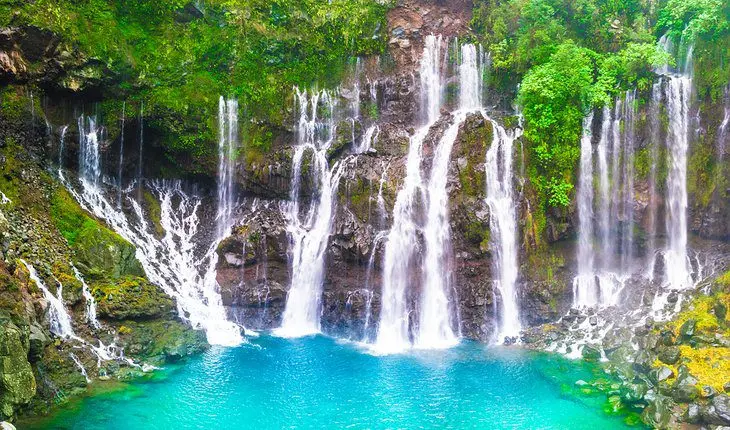
“The Great Waterfall” at Le Cirque de Saint-Même nestles within the Réserve Naturelle des Hauts de Chartreuse, a regional park just 30 kilometers outside of Grenoble, a city renowned for its natural beauty, cultural heritage, and wide array of tourist attractions.
Le Cirque de Saint-Même wows visitors with its singular landscape. An amphitheater formed from sheer 500-meter-high limestone cliffs provides the backdrop for a series of four waterfalls. La Grande Cascade is one of these waterfalls.
The lush environment, brimming with rare ferns and springtime wildflowers, adds to the enchantment. Wildlife also flourishes in this unspoiled environment. Visitors might spot foxes, eagles, tiny owls, and a plump little bird called a “Cincle Plongeur” (white-throated dipper) that dives into mountain streams in search of fish.
The Hauts de Chartreuse nature reserve offers excellent facilities for visiting Le Cirque de Saint-Même, including a paid parking lot, public restrooms, and marked hiking trails. A three-kilometer loop hiking trail provides access to La Grande Cascade. The parking lot is located steps away from the trailhead.
Picnicking at is a favorite pastime at Le Cirque de Saint-Même. For those in need of picnic supplies, the nearest village with a grocery store, cheese shop, and boulangerie (bakery) is Saint-Pierre-d’Entremont (10 kilometers from Le Cirque de Saint-Même parking).
11. Cascade du Pissieu
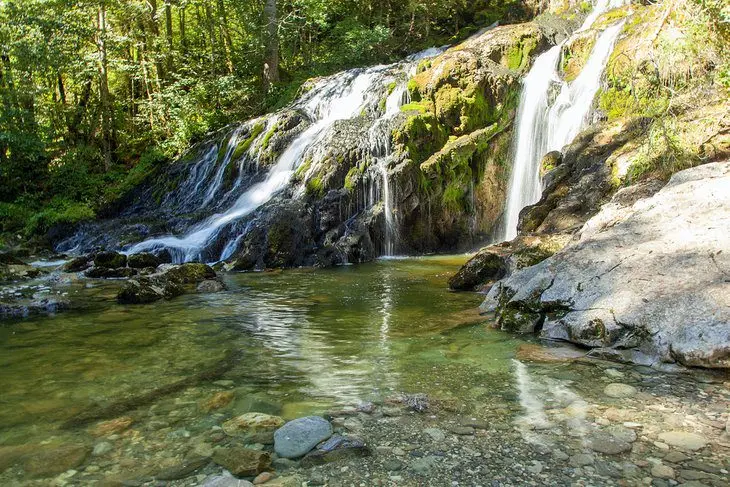
The Cascade du Pissieu is tucked away in a woodland within the Parc Naturel Régional du Massif des Bauges, classified as a UNESCO Géoparc Mondial.
One of the most beautiful waterfalls in the French Alps region, the Cascade du Pissieu is just 30 kilometers (a 40-minute drive) from Annecy and 32 kilometers (a 45-minute drive) from Chambéry
A freshwater spring at the foot of Mount Margériaz provides the source of this waterfall. The waterfall features multiple cascades, draperies of flowing water over moss-covered rocks, which gives the scenery an ethereal quality.
Accessible to most travelers, the waterfall is reached by taking a 30-minute walk on an almost completely flat trail. During summertime, many visitors come here to enjoy picnics. It is also possible to visit during winter, when the landscape is frozen and has a quiet, mystical ambience.
Visitors will find spaces to park near the trailhead.










